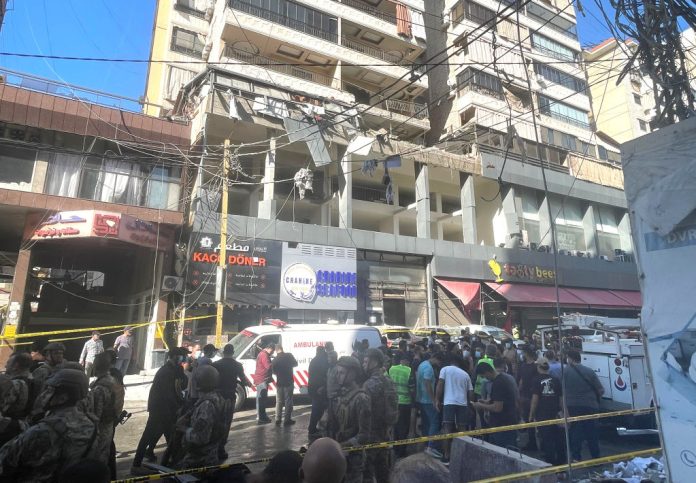A series of intense airstrikes rocked Beirut’s southern suburbs early Saturday morning as Israel intensified its military campaign against Hezbollah, following a significant assault on the Iran-backed group’s command center that reportedly aimed at leader Hassan Nasrallah.
Witnesses reported over 20 airstrikes before dawn, prompting thousands of Lebanese residents to flee their homes. Many congregated in downtown Beirut, parks, and seaside areas in search of safety. “They want to destroy Dahiye; they want to destroy all of us,” said a man named Sari, who had evacuated after receiving an Israeli order to leave. Nearby, the newly displaced were seen attempting to rest in Martyrs Square.
The Israeli military reported that around ten projectiles had crossed into Israeli territory from Lebanon, with some intercepted. This escalation followed Friday’s unprecedented five-hour barrage, the most severe bombardment of Beirut during the ongoing conflict with Hezbollah.
The recent attacks have raised alarm over the potential for the conflict to escalate further, possibly drawing in Iran, Hezbollah’s primary ally, and the United States. Although there has been no official confirmation regarding Nasrallah’s status, a source close to Hezbollah indicated he was unreachable following the strikes. Meanwhile, an Israeli official noted that senior Hezbollah commanders were specifically targeted.
Israeli Prime Minister Benjamin Netanyahu addressed the United Nations, asserting Israel’s right to continue its campaign against Hezbollah. “As long as Hezbollah chooses the path of war, Israel has no choice but to act,” he declared, following which several delegations walked out during his speech.
Air Assault in Beirut
Lebanese health authorities reported six fatalities and 91 injuries from the initial attack on Friday, marking the fourth strike on Hezbollah-controlled areas in a week and the heaviest since the 2006 war. The death toll from the recent violence is expected to rise, with reports indicating over 700 casualties across Lebanon in the past week.
In response to the ongoing violence, Hezbollah has launched numerous rockets towards Israel, targeting cities including Tel Aviv and Safed, with some civilians reported injured. The Israeli military, however, has maintained that its air defense systems have mitigated significant damage from these attacks.
As tensions soar, Iran condemned Israel’s actions, claiming they crossed “red lines” and accused Israel of using U.S.-made bombs. Meanwhile, U.S. Defense Secretary Lloyd Austin stated that Washington was not informed of the recent strikes in advance, and President Joe Biden is being kept updated on the situation.
The international community has expressed growing concern, with France proposing a 21-day ceasefire. U.S. Secretary of State Antony Blinken reiterated the importance of diplomatic solutions, urging all parties to seek a peaceful resolution. The ongoing conflict, which escalated after a missile barrage from Hezbollah following the October 7 attack by Hamas in Gaza, continues to threaten stability in the region.

